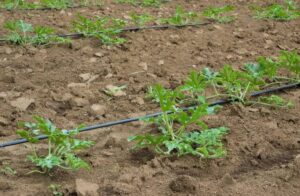
In Kenya, a country blessed with abundant sunshine, farmers are tapping into the power of the sun to transform their agricultural practices. Solar water pumps, powered entirely by solar energy, are revolutionizing the way irrigation is done in the country.
With these innovative pumps, farmers no longer have to rely on traditional fossil fuel-powered pumps, which are costly to run and contribute to environmental pollution. Solar water pumps provide a sustainable and eco-friendly alternative that not only saves farmers money but also protects the environment.
By harnessing the power of the sun, farmers can now access a reliable water supply for their crops throughout the year. This technology has helped to improve agricultural yields and provide a lifeline for farmers in rural areas who often struggle with water scarcity.
Solar water pumps have become a game-changer in Kenyan agriculture, increasing productivity, reducing reliance on fossil fuels, and improving the livelihoods of farmers. The sun is now playing a crucial role in powering agricultural growth and sustainability in Kenya.
Challenges of traditional water pumps in Kenya
Water is the lifeblood of agriculture. Without access to a reliable and sufficient water supply, farmers face challenges in growing healthy crops and maintaining their livelihoods. In Kenya, where the majority of the population depends on agriculture for their income, water scarcity is a significant problem. Traditional irrigation methods, such as manual watering or relying on rainfall, are typically insufficient to meet the water needs of crops. This is where solar water pumps come into play. These pumps harness the power of the sun to draw water from underground sources or nearby rivers, providing a consistent and reliable supply of water for irrigation. Water pumps are a game-changer in addressing the water challenges faced by Kenyan farmers, ensuring that their crops receive the water they need to thrive.
How solar water pumps work
Traditional water pumps in Kenya, such as diesel-powered or electric pumps, come with their own set of challenges. Firstly, these pumps rely on fossil fuels, which not only contribute to environmental pollution but also come with fluctuating costs. The price of diesel, for example, can vary greatly, making it difficult for farmers to budget for their irrigation expenses. Additionally, the cost of running these pumps can be high, especially for farmers in remote areas who may have limited access to affordable fuel. Maintenance and repairs of traditional pumps can also be costly and time-consuming, further adding to the burden on farmers. Furthermore, the noise and emissions produced by these pumps can have a negative impact on the environment and the health of farmers. Solar water pumps offer a sustainable and cost-effective solution to these challenges, providing farmers with a reliable water source while reducing their dependence on fossil fuels.
Benefits of water pumps in agriculture
Solar water pumps work by converting sunlight into electricity, which is then used to power the pump. The system consists of solar panels, a pump controller, and a submersible pump. The solar panels capture sunlight and convert it into direct current (DC) electricity. This electricity is then fed into the pump controller, which regulates the flow of electricity to the submersible pump. The pump, submerged in the water source, draws water up and delivers it to the irrigation system. The entire process is automatic and does not require any manual intervention. The amount of water pumped can be adjusted based on the needs of the crops and the availability of sunlight. Solar water pumps are designed to be efficient and reliable, providing farmers with a constant and consistent water supply for their irrigation needs.
Solar Water Pump Installation in Kenya
The adoption of solar water pumps in Kenyan agriculture offers numerous benefits for farmers. Firstly, such water pumps provide a cost-effective solution for irrigation. Once installed, water pumps have minimal operating costs since they rely on sunlight, a free, and renewable energy source. This means that farmers can save money on fuel or electricity bills, allowing them to invest in other aspects of their farming operations. Secondly, pumps are environmentally friendly. By using solar energy instead of fossil fuels, these pumps help reduce greenhouse gas emissions and contribute to a cleaner and healthier environment.
These water pumps also reduce noise pollution, creating a more peaceful farming environment. Additionally, solar water pumps provide a reliable and constant water supply. Unlike traditional pumps that are subject to fuel availability or power outages, solar water pumps rely on sunlight, which is abundant in Kenya. This ensures that crops receive the water they need for optimal growth and yield. Lastly, solar water pumps have a long lifespan and require minimal maintenance. This reduces the time and resources farmers need to invest in pump upkeep, allowing them to focus on other aspects of their farming activities.
Considerations when choosing a water pump in Kenya
The Kenyan government recognizes the importance of solar water pumps in promoting sustainable agriculture and has implemented various initiatives and incentives to encourage their adoption. The Ministry of Agriculture, for example, provides subsidies and grants to farmers to offset the initial installation costs of solar water pumps. These subsidies make the technology more accessible and affordable for small-scale farmers who may have limited financial resources. Additionally, the government has partnered with international organizations and NGOs to implement projects that promote the use of solar water pumps in agriculture. These projects provide training and support to farmers, helping them understand the benefits and operation of solar water pumps. By creating an enabling environment and incentivizing the adoption of pumps, the Kenyan government is driving the transition to sustainable and eco-friendly agricultural practices.





